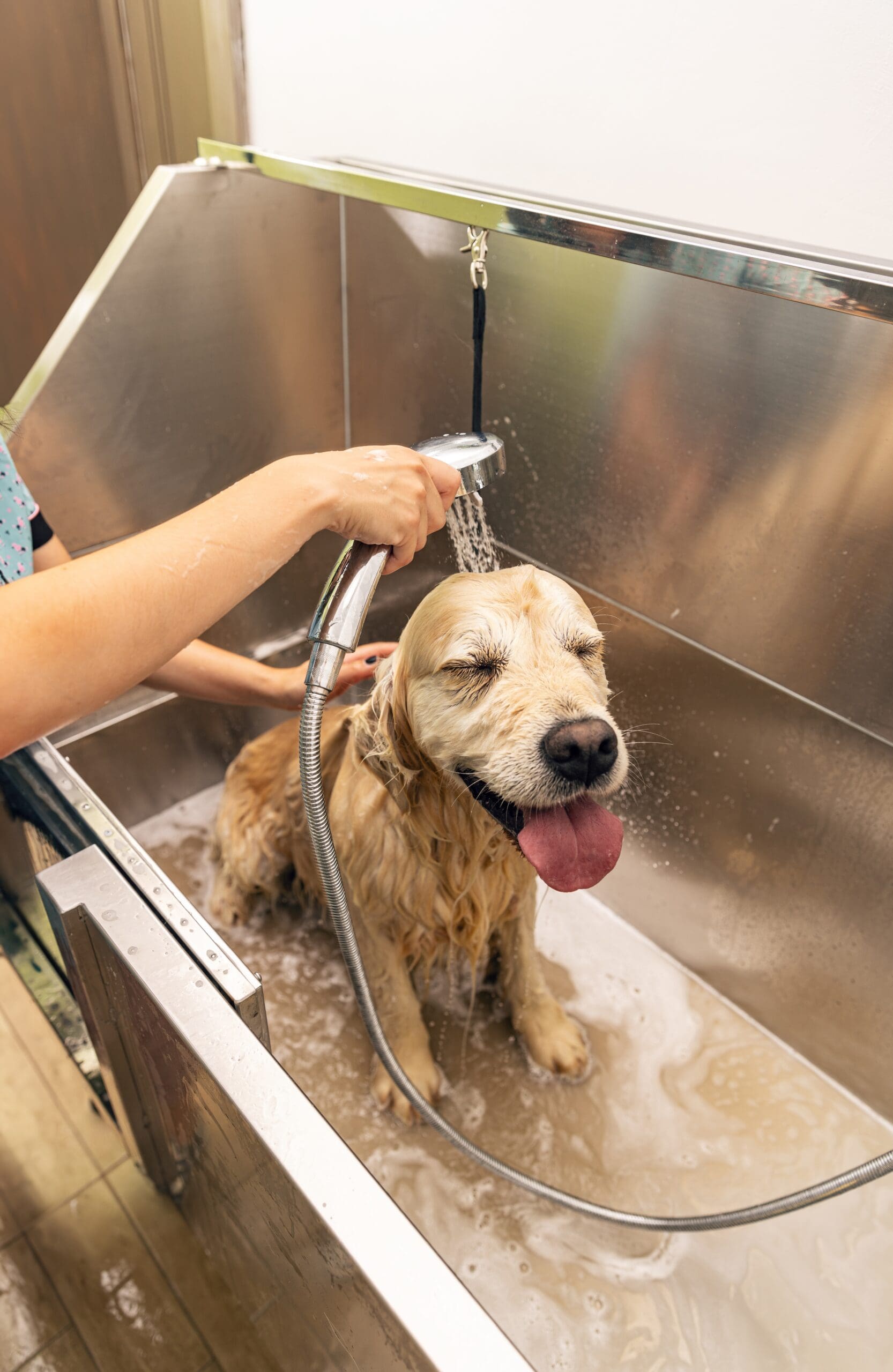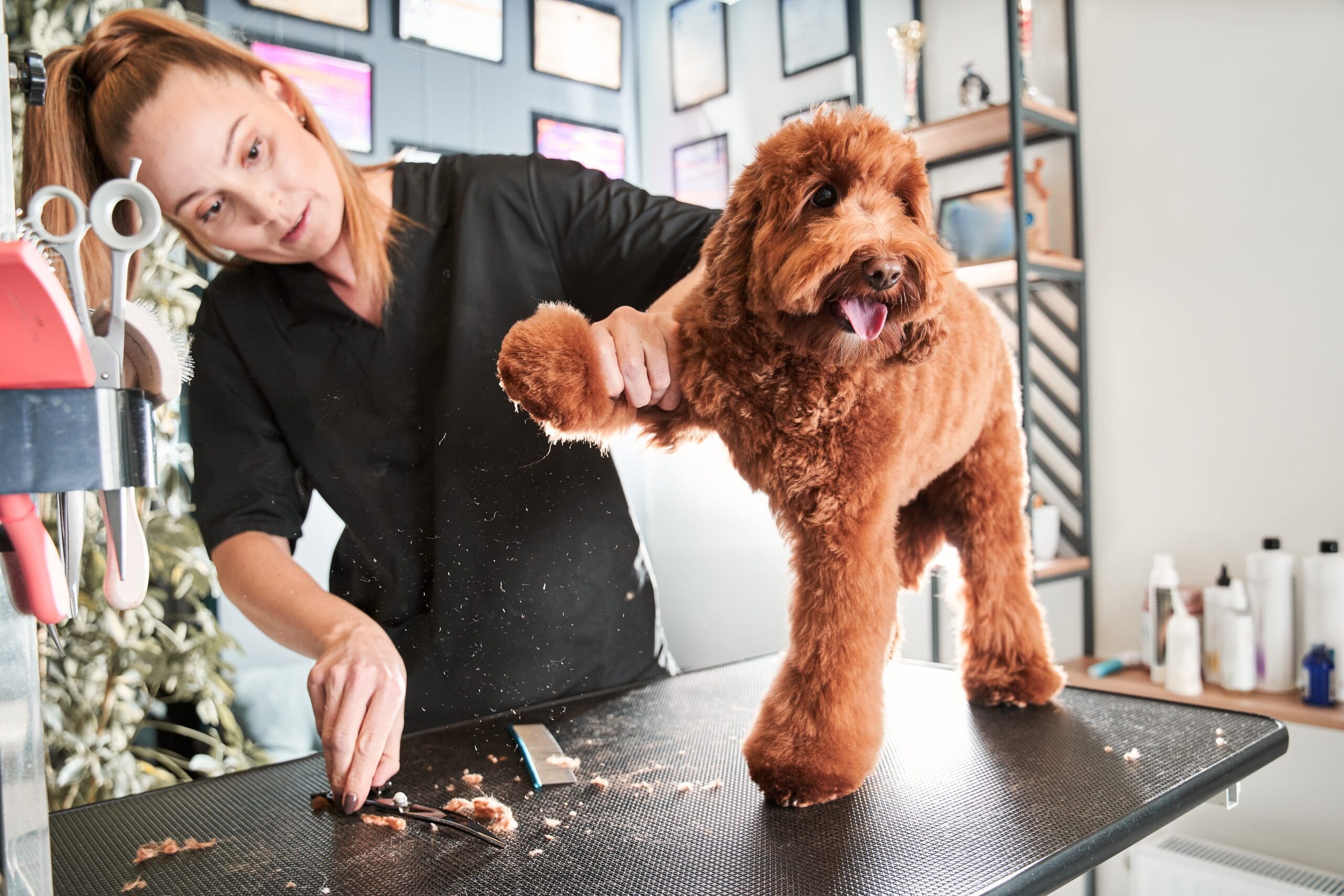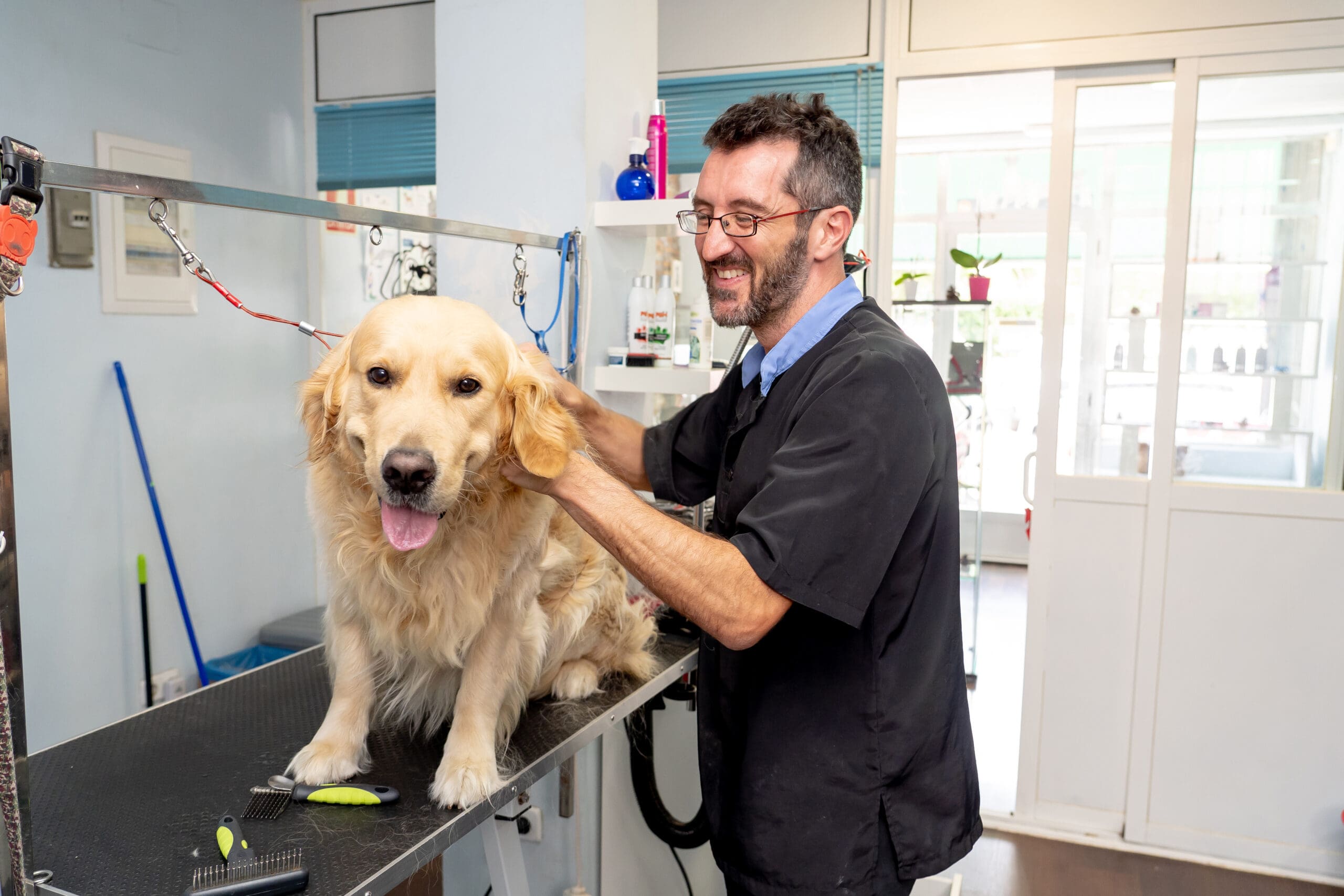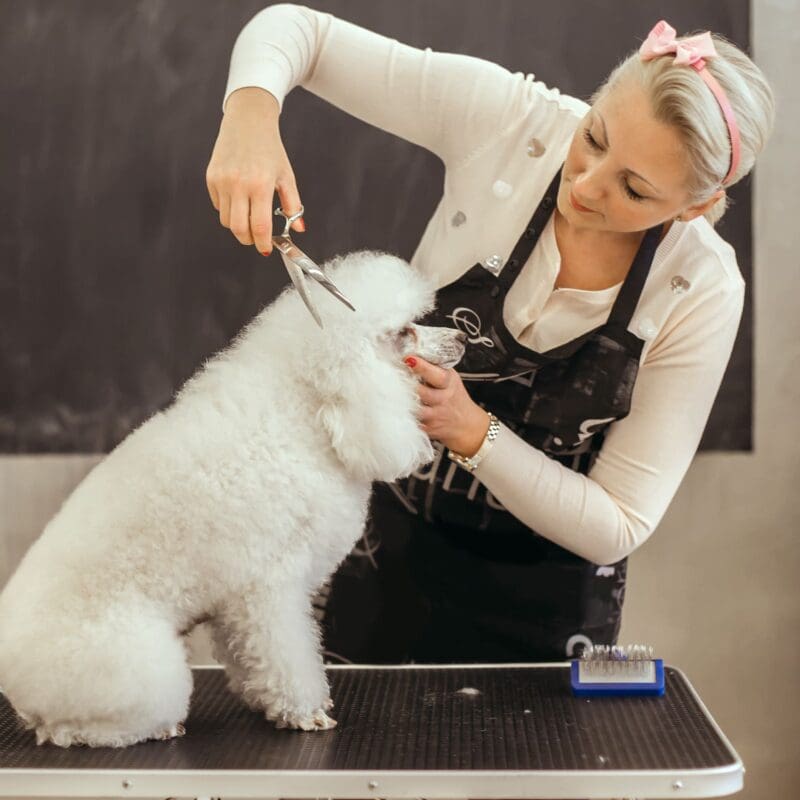How to become a Dog Groomer
Everything you need to know about becoming a Dog Groomer in 2025
If you’re passionate about dogs and have a keen eye for detail, becoming a dog groomer might just be the perfect career path for you. In today’s world, where pets are cherished members of the family, professional grooming services are in high demand. As a dog groomer, you’ll not only get to work with adorable canines every day but also play a crucial role in their health and wellbeing. By providing regular grooming services, you help prevent skin problems, detect early signs of health issues, and ensure that each furry client leaves looking their best.
With the right training and dedication, you can turn your love for animals into a rewarding profession that offers both personal satisfaction and financial stability. Let’s explore how you can embark on this exciting journey to become a skilled dog groomer.
In this Dog Groomer career guide
What does a Dog Groomer do?
A dog groomer plays an essential role in maintaining not just the appearance, but also the health and well-being of our beloved canine companions. At first glance, one might think a groomer’s job is simply to make dogs look their best, but there’s so much more to it than meets the eye. Regular grooming sessions are crucial for preventing matting and tangling of fur, which can lead to skin irritation or even infections. Beyond aesthetics, these professionals are trained to spot early signs of potential health issues such as skin conditions or ear infections – issues that might otherwise go unnoticed by owners.
Moreover, dog groomers provide services like nail trimming and ear cleaning, tasks that many pet owners find challenging to perform themselves. By keeping nails at a proper length and ears clean from wax build-up or debris, groomers help prevent discomfort and long-term health problems for dogs. Additionally, they offer valuable advice on how to maintain your pet’s coat between visits and recommend products tailored specifically for your dog’s needs.
Choosing a skilled dog groomer means investing in your pet’s overall health and happiness. It allows you peace of mind knowing that someone knowledgeable is attending to your furry friend’s needs with care and expertise. So next time you consider skipping a grooming appointment, remember it’s more than just about looking good – it’s about feeling great too!
Responsibilities of a Dog Groomer
A dog groomer plays a pivotal role in maintaining the health and happiness of our furry companions. Their responsibilities go far beyond simply making dogs look their best – they are essential to a dog’s overall well-being. Here’s why:
Brushing and Dematting: Regular brushing removes loose fur, prevents matting, and keeps the coat shiny and healthy. It also provides an opportunity to check for signs of fleas or ticks.
Bathing: Groomers use specially formulated shampoos that suit different coat types and skin conditions, ensuring that your pet’s skin is clean without being stripped of natural oils.
Nail Trimming: Keeping nails at the correct length is crucial to prevent discomfort or even injury when your dog walks or runs.
Ear Cleaning: Regular ear cleaning helps prevent infections, especially in breeds prone to ear issues due to their shape or size.
Teeth Cleaning: Some groomers offer teeth cleaning services which can help reduce plaque build-up and maintain oral health, preventing more serious dental issues down the line.
Anal Gland Expression: This less glamorous task is important for preventing discomfort and potential infections in some dogs.
Styling and Clipping: Beyond aesthetics, proper clipping can ensure comfort during different seasons by keeping pets cool in summer or warm in winter with appropriate cuts for their breed type.
By entrusting these responsibilities to a professional dog groomer, you are not only ensuring that your pet looks great but also contributing significantly to their physical health and emotional well-being.

Skills needed to become a Dog Groomer
Becoming a dog groomer is an incredibly rewarding career choice, allowing you to work closely with animals and ensure they look and feel their best. However, it requires a unique set of skills that go beyond simply enjoying the company of dogs. If you’re considering this path, here are some essential skills you’ll need to succeed:
Animal Handling Skills: Understanding canine behaviour is crucial. You’ll need to recognise signs of stress or discomfort in dogs and know how to handle them gently yet confidently.
Attention to Detail: Grooming involves more than just trimming fur; it’s about ensuring each dog leaves looking immaculate. This means paying close attention to every detail, from nail trimming to ear cleaning.
Patience and Empathy: Dogs can be unpredictable, especially if they’re nervous about grooming. Patience is key in helping them feel calm and secure during the process.
Physical Stamina: Grooming can be physically demanding, requiring you to stand for long periods and manage large or energetic dogs safely.
Creativity: While some breeds have standard cuts, others allow for more creative styling choices. Having an artistic flair can help you provide clients with unique grooming solutions that suit their pets’ personalities.
Communication Skills: You’ll need to communicate effectively with pet owners about their preferences and any issues you notice during grooming sessions.
Time Management: With multiple appointments each day, managing your time efficiently ensures that each dog receives the care they deserve without delays.
Developing these skills will not only make you a proficient groomer but also enhance your reputation among clients who trust you with their beloved pets’ care.
What qualifications do Dog Groomer need?
When considering a career as a dog groomer, it’s essential to understand the qualifications and skills that can set you apart in this rewarding field. While formal education isn’t always mandatory, having the right credentials can significantly enhance your credibility and attract more clients.
Firstly, enrolling in a recognised dog grooming course is highly recommended. These courses often provide comprehensive training on various grooming techniques, breed-specific requirements, and animal handling skills. Look for courses accredited by reputable organisations such as City & Guilds or the British Dog Groomers’ Association to ensure quality education.
In addition to formal training, gaining practical experience through apprenticeships or internships with experienced groomers can be invaluable. This hands-on experience not only hones your technical skills but also builds confidence in dealing with different canine temperaments.
Moreover, possessing certifications in animal first aid is beneficial. It demonstrates your commitment to ensuring pet safety and gives pet owners peace of mind knowing their beloved companions are in capable hands.
Lastly, developing excellent communication skills is crucial for building strong relationships with pet owners and understanding their specific grooming preferences. By combining these qualifications with a genuine passion for animal welfare, aspiring dog groomers can carve out successful careers while contributing positively to the well-being of pets everywhere.
Work environment and hours
For those considering a career in dog grooming, it’s crucial to understand the work environment and hours that come with the job. Dog groomers often find themselves in a bustling and dynamic setting, where every day brings new challenges and rewards. Typically, groomers work in dedicated grooming salons, pet shops, or even veterinary clinics. Some may choose to offer mobile services, bringing their expertise directly to clients’ homes.
The hours can be flexible but are generally aligned with standard business hours. Many groomers work full-time schedules that include weekends to accommodate pet owners who are busy during the week. This flexibility can be a significant advantage for those looking for a balance between professional and personal life.
In this role, you’ll have the opportunity to interact with both pets and their owners regularly. This interaction not only makes each day unique but also builds lasting relationships with clients who trust you with their beloved companions. The environment is hands-on and requires patience, skill, and an understanding of animal behaviour – qualities that are highly rewarding for those passionate about animal care.
Choosing a career as a dog groomer means stepping into a vibrant community where your skills make a direct impact on the wellbeing of pets while offering you varied working conditions that can suit different lifestyle needs.

How much do Dog Groomer’s earn?
When considering a career as a dog groomer, one of the most frequently asked questions is about potential earnings. In the UK, dog grooming can be a rewarding and lucrative profession, particularly for those with a passion for pets and an entrepreneurial spirit.
The earnings of a dog groomer can vary significantly based on several factors, including location, experience level, and whether they work independently or as part of a larger grooming business. On average, entry-level dog groomers might start with salaries around £18,000 to £21,000 per year. However, with experience and skill development, this figure can rise considerably.
For those who decide to set up their own grooming business or mobile service, the earning potential increases substantially. Successful independent groomers often report annual incomes ranging from £20,000 to over £30,000. Of course, building a loyal clientele and maintaining high standards of service are key components in achieving these higher earnings.
Moreover, additional services such as pet styling consultations or specialised treatments can further boost income. With the pet care industry continually growing in the UK – driven by increased pet ownership and owners’ willingness to invest in their pets’ wellbeing – the demand for skilled dog groomers remains robust.
In conclusion, while starting salaries may not seem overly impressive at first glance compared to other professions within the pet industry or beyond it – such as veterinary roles – the potential for growth is significant for those willing to invest time in honing their skills and expanding their service offerings. Therefore if you love dogs and have an eye for detail coupled with good business acumen then pursuing this path could be both fulfilling personally & financially!
Types of roles for Dog Groomer
Dog grooming is a rewarding career that offers a variety of roles to suit different interests and skill sets. Whether you’re passionate about animal care or looking to combine creativity with your love for dogs, the grooming industry has something for everyone.
One popular role is that of a salon groomer, where you’ll work in a professional setting, providing comprehensive grooming services such as bathing, clipping, and styling. This role is perfect for those who enjoy working with clients and their pets on a daily basis and take pride in transforming scruffy pups into well-groomed companions.
For those who prefer flexibility and independence, becoming a mobile dog groomer might be the ideal choice. Mobile groomers travel to clients’ homes in specially equipped vehicles, offering convenience for pet owners while allowing groomers to manage their own schedules.
Another exciting opportunity lies in specialising as a show dog groomer. This role requires an eye for detail and an understanding of breed-specific grooming standards. Show dog groomers prepare dogs for competitions by ensuring they look their absolute best according to stringent guidelines.
Additionally, there are roles within veterinary clinics or animal shelters where groomers focus on the health and wellbeing of animals. These positions often involve addressing specific needs such as flea treatments or mat removal, making them ideal for individuals interested in the welfare aspect of animal care.
No matter which path you choose within dog grooming, each role plays an essential part in ensuring our furry friends are healthy, happy, and looking their best. With dedication and passion, you can find your niche in this fulfilling field.

Professional Development and Career Paths
Professional development and diverse career paths are crucial for dog groomers who aspire to advance in their field and enhance their expertise. As the pet care industry continues to flourish, there is an ever-growing demand for skilled professionals who can provide top-notch grooming services. For those passionate about animal care, investing in professional development is not just beneficial – it’s essential.
One of the most effective ways to grow as a dog groomer is through continuous education and training. Attending workshops, seminars, and certification courses can significantly expand your knowledge base and keep you updated with the latest grooming techniques and trends. These opportunities also allow you to network with other professionals, share experiences, and gain insights that can be invaluable in your career progression.
Moreover, specialising in a particular area of grooming can open up new career paths. Whether it’s focusing on specific breeds or mastering advanced styling techniques, specialisation allows you to carve out a niche market where your skills are highly sought after. This not only increases your earning potential but also positions you as an expert in your chosen field.
Additionally, experienced groomers may consider branching out into related roles such as teaching or consulting. By sharing their expertise with aspiring groomers or advising pet owners on best practices for at-home care, they can further establish themselves as authorities within the industry.
In summary, professional development offers dog groomers numerous avenues for growth and success. By continually enhancing their skills and exploring new career paths, they ensure that they remain competitive while providing exceptional service to their furry clients.



